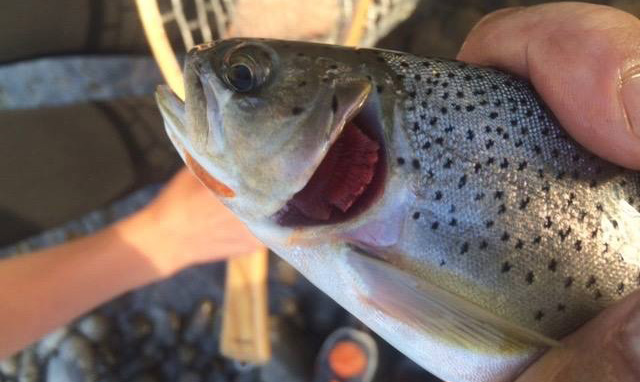On Oct. 5, Teck pleaded guilty and was fined $1.4M under the Fisheries Act for releasing pollution from their Line Creek water treatment facility in 2014. The three releases of contaminated water killed dozens of bull trout and westslope cutthroat trout.
“The fish populations in the Elk and Kootenay watersheds are world-renowned. A central principle of good management is that polluters should pay, but this failure points to much larger, longer-term water pollution issues in the Elk Valley and the Kootenay River,” says Robyn Duncan, Wildsight’s Executive Director.
Teck’s Elk Valley coal mines, which extract about 25 million tonnes of steel-making coal from the Rocky Mountains every year, have a selenium problem. Selenium, an element that is toxic to fish and other aquatic life, leaches from the mines’ huge waste rock dumps and runs into small streams and eventually into the Elk River and then the Kootenay River. Over the past two decades, selenium levels have risen significantly and effects on fish, like birth defects and reproductive failures, are becoming more common.

Teck’s Line Creek facility is the first of many planned water treatment facilities designed to remove selenium. But beyond the 2014 incident, there are ongoing issues with the treatment plant technology and the Line Creek plant isn’t actually reducing the total selenium toxicity for fish. While Teck tries adding more treatment steps to the plant, selenium-containing waste rock, expected to leach the pollutant for centuries, continues to pile up at Teck’s five Elk Valley coal mines.
“While much effort has gone into tackling the issue of dangerous selenium contamination running off from waste rock dumps at the Elk Valley coal mines, the problem is still far from solved,” says Duncan. “This 2014 failure and other ongoing issues at the Line Creek water treatment plant show that the selenium problem needs much more attention.”
Even if Teck manages to get their treatment plant to work, there still is no long term solution to the selenium problem, unless we can count on Teck to operate expensive and fossil fuel intensive water treatment plants for many centuries, long after all the coal has been mined.
Because this long term, international problem needs a long term solution with the participation of all governments, Wildsight supports the Ktunaxa Nation’s call, along with the US Kootenai tribes, for a binational commission with the US to address selenium and other water quality issues that flow from the Elk Valley.
“Our rivers deserve the best possible protection and the status quo simply isn’t good enough,” adds Duncan.
Read much more over on DeSmog…
Header photo by Garth Lenz / ILCP.







